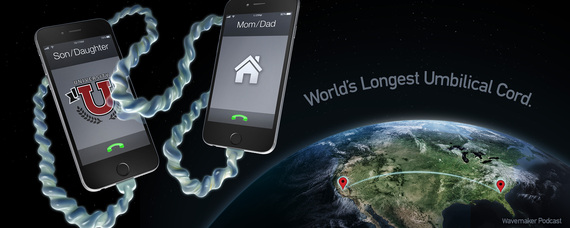
Dedicated mothers often wonder -- as do dedicated fathers -- how can I become a better parent?
With that goal in mind -- for this Mother's Day -- I offer you the gift-wrapped parenting wisdom of Julie Lythcott-Haims and the story of the world's longest umbilical cord.
Julie Lythcott-Haims was the Dean of Freshmen at Stanford University for 10 years.
She has written an influential book called How to Raise an Adult: Break Free of the Overparenting Trap and Prepare Your Kid for Success.
We spoke in depth for Wavemaker Conversations: A Podcast for the Insanely Curious.
Dean Julie has witnessed the consequences of over-parenting from her front-line perspective at Stanford. And her colleagues at a wide range of colleges across the U.S. are seeing what she's seeing.
What I saw as dean of freshmen was, over the years, more and more of our students were coming highly accomplished in a transcript and resume sense, but really quite unfamiliar with their own selves. They were incredibly good at doing what was expected of them, but they hadn't been allowed to lay their own path, make their own choices. They had not been allowed to fall or fail. And so they'd arrived at this destination ill-equipped for what the real life would sort of throw at them.
When did this all start?
Around 2005, I was beginning to see that the rise in parental involvement in the life of university students came with a decrease in a wherewithal to be adult in those university students...
What were the manifestations?
Students ... were constantly in touch with their parents to just sort of report on everything that was happening, and to seek permission about what would happen next. So they were looking for guidance about, well, what should I study? ... I just had a bike accident, what do I do?...I've got a paper back in English, and I don't understand my professor's comments. What do I do? Turning to Mom or Dad as naturally as taking a breath of air, instead of going within, they seem to lack a sense of confidence in their own ability to sit with a problem or a discomfort, or a decision, and mull it over, and handle it, cope with it, and come up with some kind of next step or solution.
A main driver of the over-parenting phenomenon is, what Lythcott-Haims calls, a "quite narrow, myopic" definition of success.
In many communities around the nation, we're so hell bent on our kids getting the highest possible GPA, being test-prepped up the wazoo, as some people say, in order to be a competitive applicant for a tiny number of colleges and universities.
Dean Julie, who is, herself, a graduate of Stanford University and Harvard Law School, came to realize she was falling into the same over-parenting trap with her own children that she was witnessing in others. Which led her to dig deep for How to Raise an Adult.
And as I tried to delve into why this was happening, and why childhood was somehow not preparing kids to have the wherewithal to be an adult, what I came to appreciate was we've been so focused on their academic and extracurricular enrichment, we're absolving them of doing the garbage, and the recycling, and the laundry, and the dishes. They're not learning that pitch in mindset, that sort of let me help, let me support this environment that I'm in. Let me do for others, let me do the grunt work ... let me do the work that constitutes a functioning life, okay? Deprived of those chores, they ended up gorgeous in a resume and transcript sense, but lacking this sort of hard work ethic that says, you know, when it's unpleasant, I'll still do it ...when it's a mess that has to be sorted out, I have the skills to figure that out.
And when messes need to be sorted out - Dean Julie sees too many young adults turning to their cell phones -- to call their parents -- hence, "the world's longest umbilical cord" (a term attributed to The University of Georgia's Richard Mullendore.)

Lythcott-Haims shared with me one of her most memorable "umbilical cord" stories. It begins when an 18-year-old freshman walks into her office and says: "Dean Julie, I don't know where my next class is."
What happened next is both comic and tragic -- and I strongly recommend you listen to Dean Julie describe it -- in her own voice -- 24 minutes, 45 seconds into our podcast.
Given the pitfalls of inadvertently creating the world's longest umbilical cord, and the empowering alternative presented by Julie Lythcott-Haims, I really do believe that sharing our Wavemaker Conversation is a great way to mark Mother's Day.
Oh, here's another way. Call your mother.